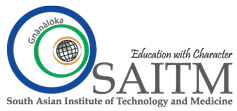Infections continue to cause morbidity and mortality worldwide and account for one-third of all deaths in the world. They are also the leading cause of death in developing countries.
Antimicrobial resistance of infectious agents is a growing public health threat to countries worldwide. Increasingly, governments around the world are beginning to pay attention to a problem so serious that it threatens the achievements of modern medicine. A post-antibiotic era—in which common infections and minor injuries can kill—far from being an apocalyptic fantasy, is instead a very real possibility for the 21st century.
The need for medical students to learn about infections and their appropriate antibiotic management is far greater today than in any other era. Thus learning microbiology will enhance the knowledge regarding specific aetiological agents of infections, their pathogenesis and susceptibility to antimicrobial agents to enable the students to prescribe specific and targeted antimicrobial therapy for infections, when they become medical practioners. In doing so, they will contribute to reduce the global burden of increasing antimicrobial resistance in some measure.
Learning microbiology and clinical work go hand in hand enabling medical undergraduates to relate the knowledge learnt in the subject to cases of infectious diseases seen and discussed in the wards. In this way the subject becomes more interesting and relevant to the clinical work in the hospital.
The Department of Microbiology undertakes teaching microbiology and immunology to provide undergraduates, knowledge of the aetiology, pathogenesis, laboratory diagnosis, treatment, prevention and control of infections and the immunological mechanisms of the human host in health and disease.
More recently the Department introduced new concepts in medical education to teaching and learning microbiology to enhance student centered learning. Through a learning management system t he department has uploaded online lectures, quizzes and formative assessments to encourage student centered learning and these have shown promising results.
Results of research conducted by the department on antibiotic resistance of hospital and community pathogens have led to valuable data which have enriched the teaching and learning aspects in medical microbiology.




